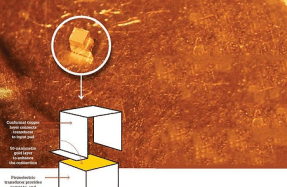BIG DATA FOR BEES

WE HAVE A SERIOUS PROBLEM – bees are dying off. Beekeepers are struggling to keep their hives healthy and thriving. In fact, more than 40 per cent of bee colonies are being lost each year in the US, a mysterious phenomenon scientists are calling colony collapse disorder. Bees are vital for most of the food that we eat. A world without bees could affect a third of the world’s crops, putting the global economy into disarray.
‘One in every three bites of food we take on any given day was probably helped along by a bee somewhere,’ says Jon Hoekstra of the World Wildlife Fund. Luckily, there’s a lot of buzz around innovative technology such as sensors, artificial intelligence, machine learning and big data that could bring us closer to exploring and understanding bee health.
One exciting project is The World Bee Project’s Global Hive Network (GHN), the first globally coordinated honeybee monitoring programme. The hives have sensors that collect data such as ambient temperature (outside of the hive), brood temperature (around the frame in the hive where the
You’re reading a preview, subscribe to read more.
Start your free 30 days



